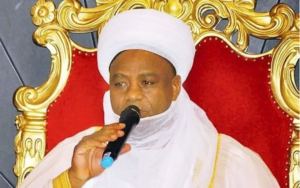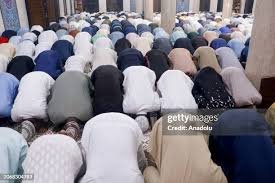With Ramadan now over, Muslims around the world and in Nigeria are celebrating Eid-el-Fitr with feasts, prayers, and family gatherings.
However, a crucial question arises: Can the spiritual growth and acts of generosity cultivated during the holy month be sustained beyond Ramadan? Hussaini Kafi in Kano spoke to some residents on the perspectives on the issue

For 29 days, Muslims dedicated themselves to fasting, increased prayer, and charity. The holy month instilled self-discipline, heightened spirituality, and a sense of unity. However, the true test of Ramadan’s impact is whether these values persist beyond its duration.
Religious scholars, charity workers, businesspeople, and everyday citizens share their perspectives on this challenge.
Imam Shariff Muhammad Ghali, the Chief Imam of Filin Kashu Mosque in Unguwa-Uku quarters, Tarauni Local Government Area, Kano State, has explained the true purpose of fasting in the month of Ramadan.
Citing the Qur’an in verse 188, he stated that Allah has made fasting obligatory for Muslims so they may increase their faith and develop piety.
Primary Goal of Fasting
He further emphasized that the primary goal of fasting is to reinforce obedience to Allah (S.W.A).
Regarding how one can maintain the good habits learned during Ramadan, Imam Ghali noted that it depends on a person’s faith and the effort they put into righteous deeds while fasting.
“If a person strives to follow Allah’s commands diligently during Ramadan—especially by refraining from sinful acts and increasing their good deeds—it will help them continue these actions even after the fast,” he said.

According to him, there are four main reasons why people abandon their good deeds after Ramadan.
The first reason is for those who fast out of compulsion. “Anyone who fasts unwillingly, not with the intention of drawing closer to Allah, will likely abandon all good deeds they performed during Ramadan once the month is over.”

The second category consists of those who see Ramadan as a time to fulfill personal needs. Imam Ghali cite an example of traders who view the month as an opportunity to make money or individuals who dedicate the last ten days of Ramadan solely to supplicating for personal gains rather than engaging in sincere worship.
Spiritual Status
The third group includes those who perceive Ramadan as a time for increased rewards. “As stated in the Qur’an, every good deed performed in Ramadan carries multiplied rewards.
Therefore, those who engage in righteous acts solely because of this increased reward may stop once the month ends,” he explained.
The last category consists of those who fast to attain a higher spiritual status with Allah. These individuals already have a strong religious standing but use Ramadan as an opportunity to draw even closer to Allah. Imam Ghali noted that such people are rare among Muslims.
They view Ramadan as a chance to intensify their worship and good deeds to elevate their spiritual rank.
He further stated that these last-category individuals are generally consistent in their worship, whether during Ramadan or not.
Acts of Worship After Ramadan
In conclusion, he explained that all Muslims fall into one of these four categories. Therefore, a person’s ability to continue their acts of worship after Ramadan depends on which category they belong to.
He urged Muslims to be cautious and avoid engaging in sinful acts after Ramadan, reminding them that they may not get another chance to witness the holy month.

“Even if they do, there is no guarantee they will be in good health to observe it properly,” he warned.
Similarly, Malam Auwal Bashir Sulaiman, a well-respected Islamic scholar in Kano, underscores the need for consistency in faith and good deeds.
He notes that many people exhibit heightened religiosity during Ramadan, only to abandon it afterward. He argues that a true believer is not one who is pious only for one month but one who maintains devotion throughout the year.
Faith Is Not Seasonal
“Many Muslims become more prayerful, charitable, and conscious of their actions during Ramadan. But faith is not seasonal—our relationship with Allah should not end with Eid celebrations,” he stated.
Beyond personal devotion, he stresses the social responsibility that comes with faith, particularly in continuing charitable acts beyond Ramadan.
“We must continue to support the poor, feed the hungry, and take care of orphans beyond Ramadan. This is what Islam teaches,” he added.
On the streets of Kano, the effects of Ramadan are still visible, but many residents admit that sustaining the generosity and heightened spirituality of the holy month can be difficult.

Fatima Abdullahi, a teacher in Hotoro, reflects on how Ramadan helped her develop self-discipline. “I learned to control my temper and focus better at work. It’s a lesson I intend to carry forward even after Ramadan,” she said.
Free Iftar Meals
Abdullahi Musa, a volunteer at Fagge Central Mosque, speaks about the sense of unity and generosity that characterized the month. He recalls how hundreds of people benefitted from free Iftar meals provided at the mosque.
“The lesson is that we should always help, not just during Ramadan. If we can afford to eat three times a day, we should think of those who struggle for just one meal,” he said.
However, sustaining charitable efforts beyond Ramadan remains a challenge. Aisha Bello, who works with a local charity, explains that donations typically drop after Eid, making it difficult to support the needy.
“People are very generous during Ramadan, but after Eid, it’s as if they forget that the poor still exist. We need to change that mentality,” she said.
From an economic perspective, Ramadan significantly impacts businesses, particularly food vendors, tailors, and traders. Bashir Aliyu, a trader at Singer Market, describes how sales peak during Ramadan but decline sharply afterward.
After Eid, Business Slows Down
“In Ramadan, people buy a lot—foodstuff, clothing, and other essentials. But after Eid, business slows down because people have spent a lot already,” he said.
A sociologist, Dr. Sani Ahmad, provides an academic perspective on how economic and social behaviour shifts during and after Ramadan.
He notes that while people tend to spend more and give more during the holy month, the challenge is maintaining these habits throughout the year.
“Spending patterns change significantly. During Ramadan, there’s a surge in consumption and charity, but afterward, we see a decline in both.
The challenge is finding ways to maintain economic stability and social welfare post-Ramadan,” he said
On a spiritual level, many Muslims struggle to maintain the routine of prayers and Quran recitation that they developed during Ramadan.
Night of Power
The last ten days, particularly the Night of Power (Laylatul Qadr), are considered the most sacred, with many believers spending them in I’tikaaf (seclusion in the mosque). However, once Ramadan ends, many find it difficult to sustain these practices.
For AbdulRahman Umar, a student at Bayero University Kano (BUK), the holy month was a period of renewal. “I used to struggle with consistency in my prayers,” he admitted. “Ramadan helped me build a routine, and I’m determined to stick to it beyond Eid.”
As Kano residents celebrate Eid, wearing new clothes, preparing special meals, and visiting loved ones, community leaders are reminding them that the essence of Ramadan should not be forgotten.
setting personal resolutions
Many are now setting personal resolutions to maintain the habits developed during the holy month.
“I have decided to keep fasting on Mondays and Thursdays, as recommended by the Prophet,” said
Mariam Usman, a businesswoman at Kofar Wambai Market. “It keeps me disciplined and connected to my faith.”
Religious scholars, social workers, and economists all agree that Ramadan should not be seen as an isolated event but as a means to inspire lasting change. The moral and spiritual growth gained must not fade with the passing of the holy month.
As Muslims around the world and in Nigeria transition from Ramadan to their normal routines, the call remains clear—faith, discipline, and generosity should be part of everyday life, not just seasonal habits.


